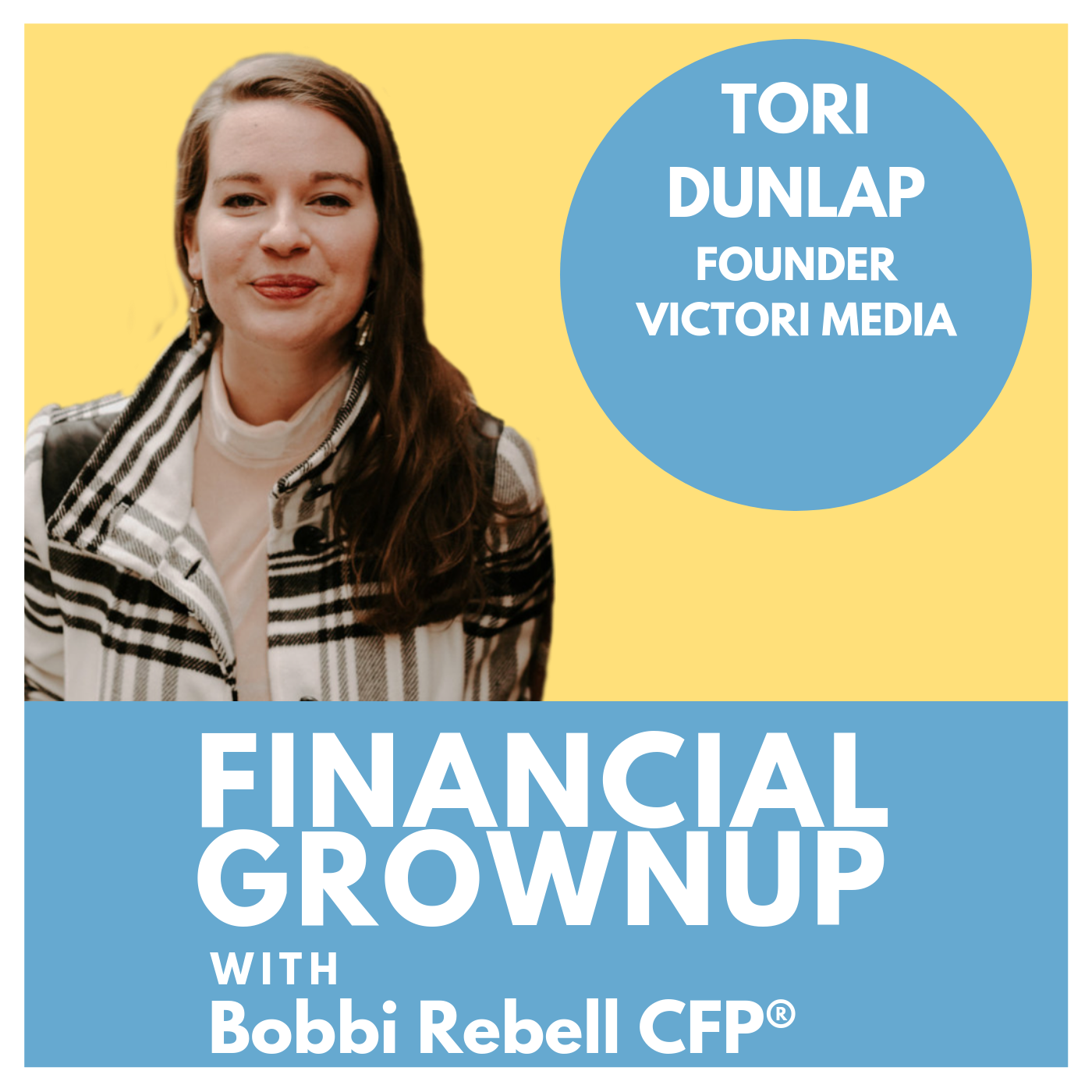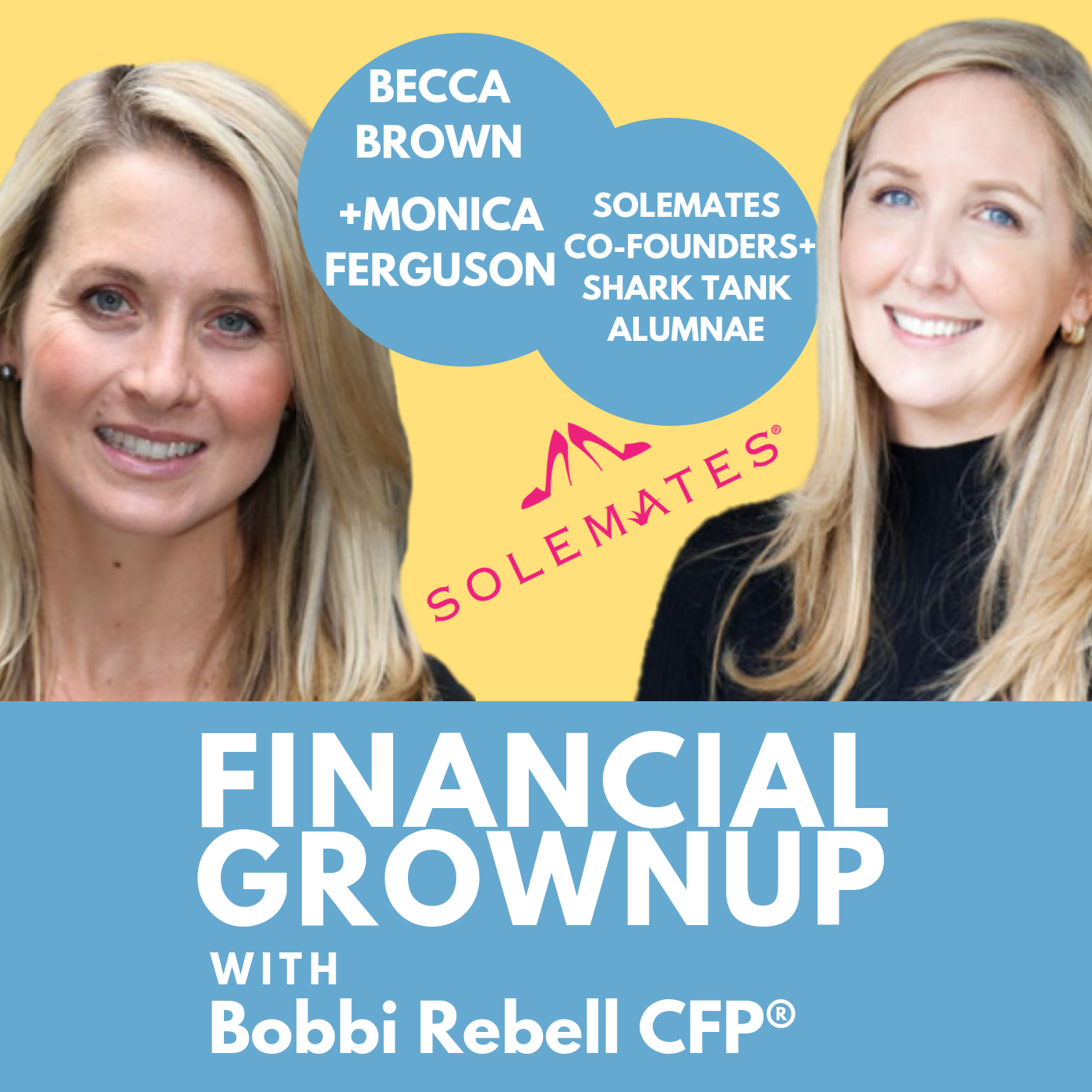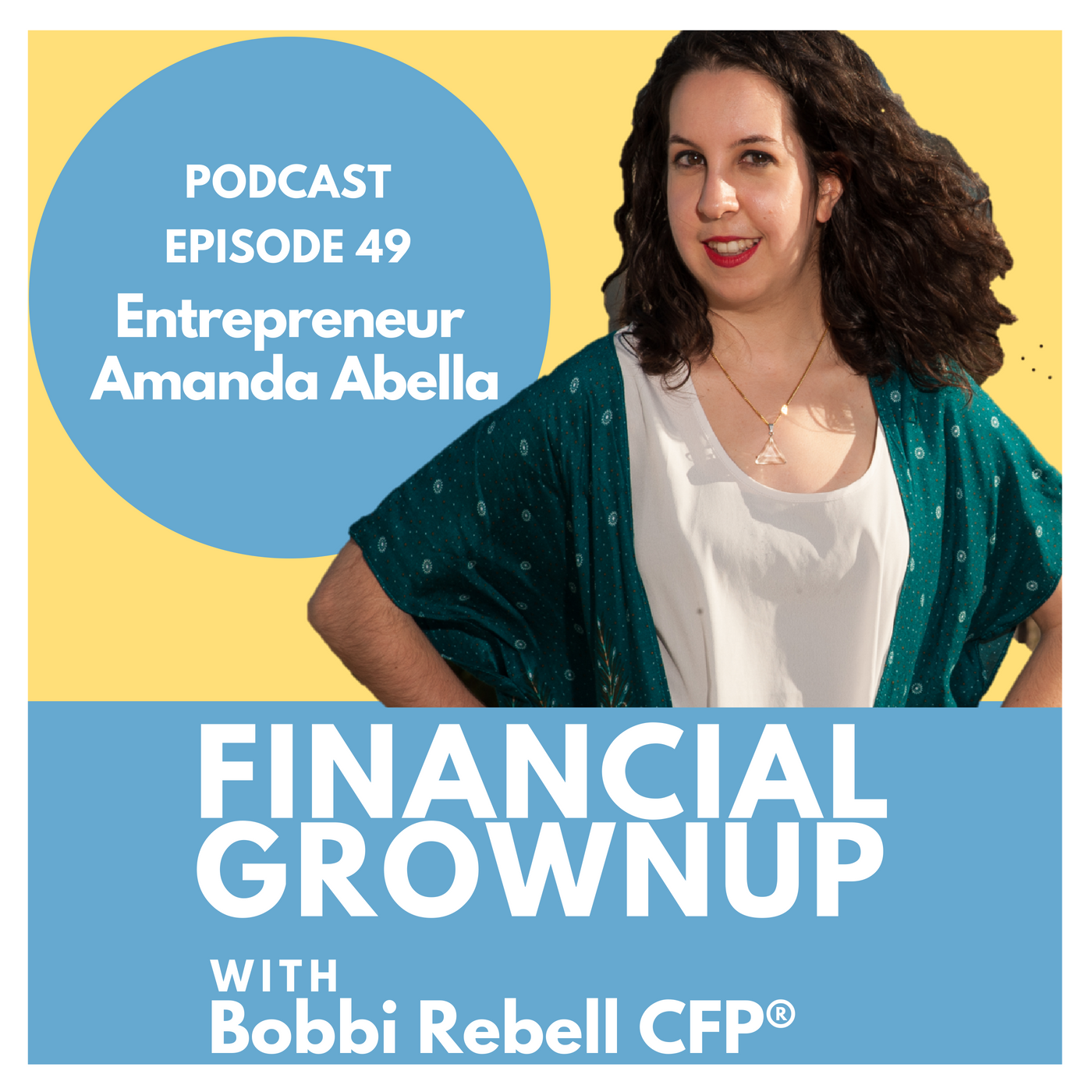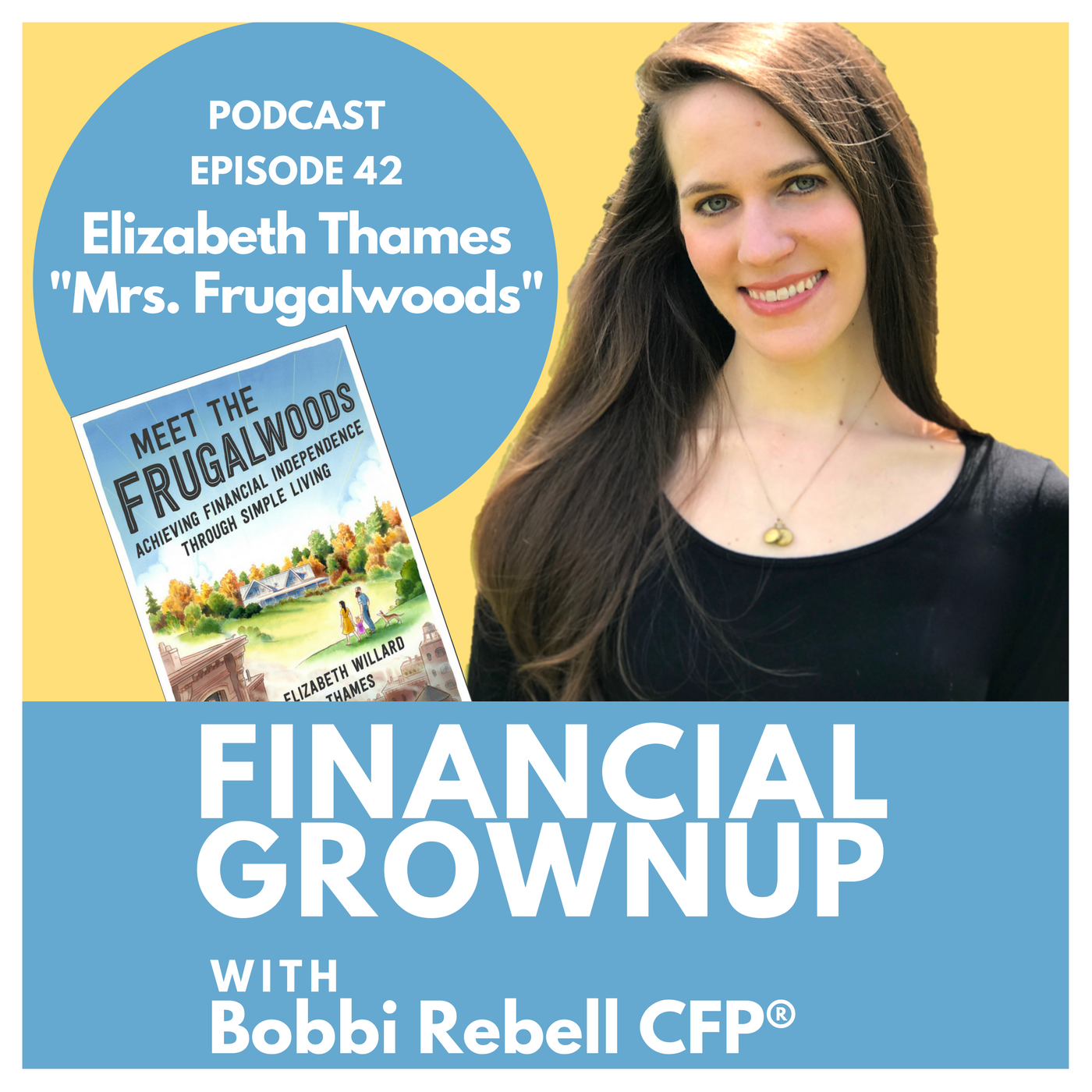Transcription
Andy Hill:
I took advantage of these student loans that I was using for my MBA program at the time, and just took a little bit extra from my student loans in order to pay for my wife's engagement ring. That's kind of how I started off my marriage with a little bit of debt, also with a little bit of love, as well.
Bobbi Rebell:
You're listening to Financial Grownup with me, certified financial planner, Bobbi Rebell, author of How To Be A Financial Grownup, and you know what? Being a grownup is really hard, especially when it comes to money. But it's okay, we're gonna get there together. I'm gonna bring you one money story from a financial grownup, one lesson, and then my take on how you can make it your own. We got this.
Bobbi Rebell:
Hey friends, they say love is blind. That was certainly true for our guest today. Before we get to him, quick welcome to everyone, especially our new folks, we keep the episodes, just so you know, to around 15 minutes. You can fit it easily into your busy schedule while you're running errands and so on.
Bobbi Rebell:
A lot of regulars, though, say they enjoy listening to a few at a time, especially if they are commuting. The idea, do what works for you. You get to hear an inspiring, and hopefully entertaining money story, and then get some specific advice, money tips, things that you could do right away.
Bobbi Rebell:
Today's story is definitely entertaining, heartwarming, but you also might get that sinking feeling in your stomach, like, "Oh, no! He did not!" We've all been there, so into our loved ones that we just want to get them exactly what they want. Budgets, whatever, we find the money, even if we find it in our student loans? Yes, I'm talking to you, Andy.
Bobbi Rebell:
Let's roll the interview.
Bobbi Rebell:
Hey, Andy Hill, you're a financial grownup, welcome to the podcast.
Andy Hill:
Thanks so much for having me, Bobbi.
Bobbi Rebell:
Congratulations on the success of your podcast, marriage, kids, and money. Nominated for the most important podcast awards that there are, the 2017 Plutus Awards. You were nominated for best new personal finance podcast, so congratulations!
Andy Hill:
Thank you so much, yeah. It was a great honor, and look forward to keep on bringing exciting material for all those people out there who are married with kids that love talking about money, or just want to give their families a better opportunity in the future.
Bobbi Rebell:
Well, I am a hopeless romantic, in addition to focusing on money, and you brought with you a money story that is both romantic and financial, having to do with your engagement. Tell us what happened.
Andy Hill:
Yeah, so back in, oh, this is maybe in my mid-twenties, I met an incredible girl named Nicole and fell in love with her. When you fall in love and you start to see the opportunity for marriage coming up, the first you think of, as a guy is, "Man, I got to get this ring thing going."
Andy Hill:
Me, not making that much money at the time, was probably making $35,000 a year, I said, "Well, I better start saving a little bit of money to make this thing happen." Unfortunately, since we were dating long distance from California to Michigan, my bank account was a little light, we'll say, but my love for her was continuing to grow. I know I had to take advantage of this moment and go for this engagement.
Andy Hill:
We looked at rings together at the store, and we found the ring that she liked, with the type of the style, I found out it was about $5,000.
Bobbi Rebell:
Ouch!
Andy Hill:
Yeah. That was about $4,500 more than I had.
Bobbi Rebell:
Okay.
Andy Hill:
I decided to go for it anyway because I was in love, and I wanted to move this thing forward. The way that I went about it was I took advantage of these student loans that I was using for my MBA program at the time, and just took a little bit extra from my student loans in order to pay for my wife's engagement ring. That's kind of how I started off my marriage with a little bit of debt, also with a little bit of love, as well.
Bobbi Rebell:
Oh my goodness. That is such a big no-no though. Let me just ask you, taking it back a little, did it occur to you to either wait and save up more, or maybe downsize the ring a little bit, or find ... I don't know if that was maybe the best interest rate you could get on student loans versus taking out a different kind of loan. It's certainly better than a credit card, we know that.
Bobbi Rebell:
Any other considerations at the time?
Andy Hill:
Oh yeah, Bobbi. All these things I could've done better. Could've gotten a better opportunity to get a lower interest rate than ... I think it was 6.8% that I was paying for my student loans. I could've maybe spoken to my wife ... my future wife about it a little bit about the- [inaudible 00:04:43][crosstalk 00:04:43]
Bobbi Rebell:
So, she didn't know about this, she did not know that you went into debt to get her ring.
Andy Hill:
Nope.
Bobbi Rebell:
What would she have said if she knew?
Andy Hill:
I believe that she would've said, "That's not a good idea. We can either wait, or we can look at something that's a little bit more feasible for your actual budget."
Bobbi Rebell:
Okay, but you did not talk to her, so that's also a lesson. Just to point out. That's one of the things you talk about a lot on your podcast, is the communication aspect.
Andy Hill:
Absolutely. I preach about it all day long, but did I do it back in my mid-twenties? No. I did not. Definitely having communication with your spouse, or your future spouse is an incredible way to start the marriage, and I definitely did not do that.
Bobbi Rebell:
If you can get into the mind of 27-year-old Andy, what were you thinking at the time?
Andy Hill:
What I was thinking was, "I'm in love, and I want to make this thing happen as soon as possible. She's shown me the type of ring that she wants, and I want to make her happy." Unfortunately, I didn't think about any of the other consequences that went along with that: the interest rate, not speaking to my future wife about something that's super important. That could've been a really pivotal moment for us, actually, to speak about something that important, and I passed it up, for sure.
Bobbi Rebell:
When did she find out? Assuming it's not now, listening to this podcast? When did she find out when you had done that?
Andy Hill:
She found out about the debt that I had, as well as the ring situation a little after we got married when-
Bobbi Rebell:
Whoa, whoa, whoa, wait. The debt you had in addition to the ring. What was the other debt you had? You had $4,500 from the ring, and then what else?
Andy Hill:
It was all these student loans that I had, it was about $40,000 of student loans total, as well as a home equity line of credit, which probably equated to another $10,000, so about $50,000.
Bobbi Rebell:
Okay, go on.
Andy Hill:
Yeah, yeah, so we got married, and then with that comes the merging of the finances, right? As we were merging finances we started to have the conversations then about what my debt situation was, and what her debt situation was, and then it became our problem, and something that we worked on together, but she didn't realize until then, "Oh, so I'm now paying off the ring that you bought for me."
Bobbi Rebell:
"I'm paying off my own engagement ring. Thank you very much."
Andy Hill:
How romantic, right?
Bobbi Rebell:
That's so romantic. No. No, no, no, no. Quickly tell us how did it resolve? How did you pay all that off?
Andy Hill:
Well, yeah, so we got together and we made a plan to pay it off. We started to talk about potentially having kids in the future, and we said, "Hey, well, let's work together and pay this off." Combined we were making a little bit over six figures in a salary. We said, "All right, let's live on half, and pay this off as fast as possible," and we were able to clobber it in about 12 months.
Bobbi Rebell:
What is the lesson for our listeners from that now that you're a wise, wise old man in your thirties?
Andy Hill:
Yeah, I would say communication as early as possible in your relationship, especially when it comes to money is so important. The opportunity that I did not take advantage of was to speak to my future wife about, "Hey, this ring that you want, I love it, you love it, it would make you feel great, but I just don't have the money right now in order to make this happen. We can either delay our marriage in order to get the ring, or we can look at something that's a little bit more feasible."
Andy Hill:
That would've been a very good financial grownup conversation to have with her at that point in our marriage, for sure. Communication and just working on things as a married couple before you're even married shows the true partnership before you get into it.
Bobbi Rebell:
I love the money tip that you're going to share, because we kind of moved things forward now to the mindset of being parents, which you now are. You have two children, ages six and four. That means time to think about college and getting ready. It's never too early. Tell us your money tip.
Andy Hill:
Absolutely. When we got married we decided to have children, and one of the things as we started to get our financial grownup selves together was, "Hey, if we're gonna be helping our kids get through college we got to start saving now."
Andy Hill:
We started researching 529 programs, and the cool thing about 529 programs is that you don't have to take advantage of the one that's specifically in your state. There are other programs that maybe have lower fees to consider. We did a broad research of all the programs that were available to us in the U.S.
Andy Hill:
We ended up going with our state, because it had good fees, or lower fees, through TIAA-CREF, and actually, there was a great state income tax break, as well, that helps us save a little bit of money each year as we donate into ... as we contribute into our kids' college fund.
Andy Hill:
I guess my tip would be, take a look at all the opportunities that you have to save for your kids through a 529 program, start as early as possible, but definitely take a look at the fees that are associated with it, because some of the programs might have higher fees, and they might not even be in your state.
Andy Hill:
Taking a look at that, as well as getting an understanding of the tax advantages of utilizing a 529 with your state. It's a great way to save, and it's a great way to prepare for the future college costs that we're all looking for as parents.
Bobbi Rebell:
Definitely, and I also want to just ask you quickly before we wrap up about your E-book.
Andy Hill:
Yes, have a E-book on my site called The Young Family Wealth Playbook. It is an amalgamation of all these interviews that I've done on my podcast from the 50+ self-made millionaires, financial independent rock stars, and personal finance experts, and I've taken all that information that will help individuals who are reading it to look at what they can do, all the way from the start of marriage, all the way to being parents and helping your family to build wealth.
Andy Hill:
It's seven steps that I've taken from those conversations, and it'll walk people through how they can grow wealth and create a great future for their family.
Bobbi Rebell:
So cool. Tell us where people can find you, social handles, all that good stuff.
Andy Hill:
Excellent, yeah, so I'm at marriagekidsandmoney.com. On that site you'll be able to check out the podcast, The Young Family Wealth Playbook, as well as my blog. I'm also very busy on Twitter: @andyhillmkm. I'd love to have some conversations, and thanks for checking it out.
Bobbi Rebell:
Thank you so much, Andy.
Andy Hill:
Excellent. Thanks so much, Bobbi.
Bobbi Rebell:
Oh, Andy. We can't help but be charmed by you, even though I can't believe you did that. So glad you clearly are a financial grownup now, and even more happy that your wife is still there with you.
Bobbi Rebell:
Financial grownup tip number one: remember, the ring is just the beginning of the cost of your trip down the aisle, so if you blow your budget on that, oh my goodness. According The Knot, Americans spend an average of $6,351 on just the wedding ring.
Bobbi Rebell:
In Andy's case, given that he got married a few years ago, Andy was relatively in line at the $5,000 mark. If you want to stretch for that, that's fine, but you got to keep in mind what's coming next. The wedding. The average cost of a wedding, according to The Knot, again, is over $33,000, and, of course, in New York City, couples spend even more, almost $77,000, so that's a choice. But, think about it, if you are going to spend that kind of cash, make those decisions as a couple. Andy admits he messed up by not talking to his wife.
Bobbi Rebell:
Financial grownup tip number two: 529s are a great resource for parents, and if you are sending kids to private school, you now can use them for that, as well, but there are a lot of rules, and you need to play by those rules, or you're gonna get stuck. You're gonna pay higher fees than needed, as Andy warned, you also may have penalties if you try to get the money in a non-qualified way.
Bobbi Rebell:
I will leave a link to the sec.gov website that has a very easy and straightforward explainer article. Read it. I'm gonna leave some other helpful links, as well. You need to do your homework on this, because you may not be able to get to the money in the way you want, when you want, without the penalties, so just do it with your eyes open.
Bobbi Rebell:
Thanks to everyone for joining us. If you like the promo videos that you are seeing on social media you can win one. Just share them in social media when you see them. I'll be making one for a lucky winner in July, basically based on whoever shares the most.
Bobbi Rebell:
To learn more about the show go to bobbirebell.com/financialgrownuppodcast, and, of course, stay in touch by following me on Twitter: @bobbirebell, on Instagram: @bobbirebell1.
Bobbi Rebell:
Andy, you truly became a financial grownup by learning your lesson. Glad it all worked out for you and the wife, and now your children. Thank you for helping us all get once step closer to being financial grownups.
Bobbi Rebell:
Financial grownup with Bobbi Rebell is edited and produced by Steve Stewart, and is a BRK Media production.




































